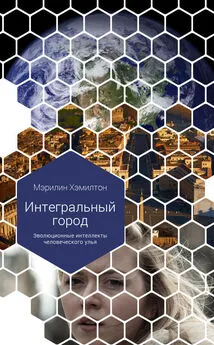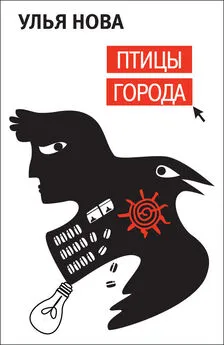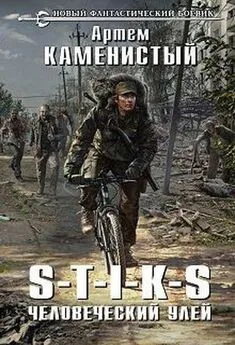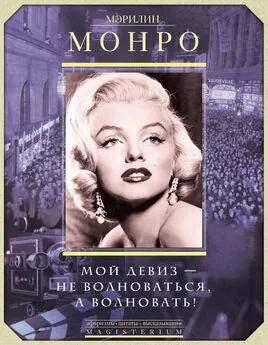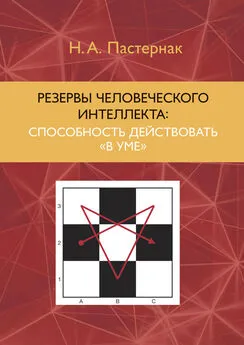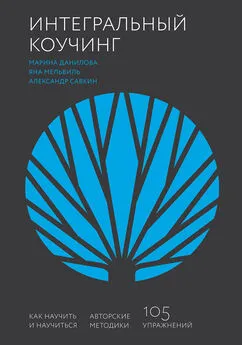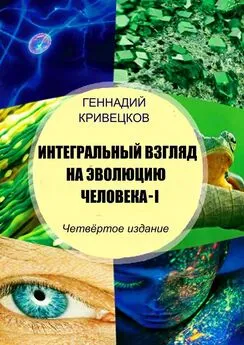Мэрилин Хэмилтон - Интегральный город. Эволюционные интеллекты человеческого улья
- Название:Интегральный город. Эволюционные интеллекты человеческого улья
- Автор:
- Жанр:
- Издательство:Литагент «ИП Баранов»fed4515a-c319-11e4-84ea-002590591dd6
- Год:2013
- Город:Москва
- ISBN:нет данных
- Рейтинг:
- Избранное:Добавить в избранное
-
Отзывы:
-
Ваша оценка:
Мэрилин Хэмилтон - Интегральный город. Эволюционные интеллекты человеческого улья краткое содержание
Каким образом столкновение различий, которые отделяют людей, цели, интересы и приоритеты друг от друга, может генерировать свежую энергию, необходимую для решения проблем двадцать первого века? Где непредсказуемо развиваются взаимосвязи, прокладывающие новые пути для обучения сообществ и дающие новые инструменты в руки городских лидеров и горожан?
В настоящей книге исследуется новая интегральная парадигма для развития городов, которая позволяет ответить на поставленные вопросы. Она прослеживает эволюцию системного, стратегического, социального и строительного интеллектов города и показывает градостроителям, законодателям, горожанам, гражданскому обществу и защитникам окружающей среды, как можно ощущать город, проживать в нём и устанавливать с ним взаимоотношения на основе целостности. В «Интегральном городе» предлагается исследование контекстов географии, экологии и жизненных циклов города. Книга служит читателю путеводителем по интегрированному маршруту по многообразным интеллектам, или линиям развития городской среды.
Интегральный город. Эволюционные интеллекты человеческого улья - читать онлайн бесплатно ознакомительный отрывок
Интервал:
Закладка:
Kauffman, S. A. (1993). The Origins of Order: Self-organization and Selection in Evolution . New York: Oxford Press.
Laszlo, E. (2004). Science and the Akashic Field: An Integral Theory of Everything . (2007 ed.). Rochester, Vermont: Inner Traditions.
Laszlo, E. (2006a). The Chaos Point: The World at the Crossroads . Charlottesville, VA: Hampton Roads Publishing.
Laszlo, E. (2006b). Science and the Reenchantment of the Cosmos: The Rise of the Integral Vision of Reality . Rochester, VT: Inner Traditions, Bear & Co.
Leonard, G. & M. Murphy (1995). The Life We Are Given . New York: Jeremy P. Tarcher/Putnam.
Lipton, B. (2005). The Biology of Belief: Unleashing the Power of Consciousness, Matter and Miracles . Santa Rosa, CA: Mountain of Love/Elite Books.
Loop Initiatives. (2007). LOOP Integrated Rating Indicator for Sustainability . www.loopinitiatives.com/iris.html
Lopez, B. & T. C. Pearson (1990). Crow and Weasel . Berkeley, CA: North Point Press.
Lorenz, E. (1995). The Essence of Chaos . Seattle: University of Washington Press.
Margulis, L. & D. Sagan (1997). Microcosmos: Four Billion Years of Microbial Evolution . Los Angeles: University of California Press.
Maturana, H., & Varela, F. (1987, 1992). The Tree of Knowledge . Boston: Shambhala.
Mau, B. & J. Leonard (Eds.). (2004). Massive Change . New York: Phaidon Press.
McGregor, R. (2007). «7 50,000 a Year Killed by Chinese Pollution .» Retrieved July 4, 2007, from Financial Times Online: www.ft.com/cms/so/8f40e248-28c7-11dc-af78-000b5df10621.html
McIntosh, S. (2007). Integral Consciousness and the Future of Evolution: How the Integral Worldview Is Transforming Politics, Culture and Spirituality . St. Paul, MN: Paragon House.
McKibben, B. (2007). Deep Economy: The Wealth of Communities and the Durable Future . New York: Time Books, Henry Holt and Co.
McQuade, A. (2005). « Reviving our Interiors: Serving the Mentally Ill Living on Our Streets .» AQAL, 14..
Meller, H. (1990). Patrick Geddes: Social Evolutionist and City Planner . London: Routledge.
Miller, J. G. (1978). Living Systems . New York: McGraw-Hill.
Mittelstadt, M. (September 7, 2007). « Mysterious Die-off of Honeybees Explained .» The Globe and Mail.
Moir, A. & D. Jessel (1991). Brain Sex. New York: Dell.
Monbiot, G. & M. Prescott (2007). Heat: How to Stop the Planet from Burning . Toronto: Anchor Canada.
Morelli, M., A. Leonard, T. Patten, J. Salzman & K. Wilber (2006). Welcome to Integral Life Practice: Your Guide to the ILP Starter Kit (1 ed.) . Denver, CO: Integral Institute.
Morgan, G. (1998). Images of Organization . Thousand Oaks, CA: Sage Publications.
Mumford, L. (1946). Values for Survival: Essays, Addresses, and Letters on Politics and Education . New York: Harcourt, Brace and Co.
Mumford, L. (1970). « Closing Statement.» In The Ecological Conscience: Values for Survival» . R. Disch (Ed.), (pp. 91-102). Englewood Cliffs, NJ: Prentice Hall.
Murphy, M. (1992). The Future of the Body: Explorations into the Further Evolution of Human Nature . Los Angeles: Jeremy P. Tarcher.
Naess, A. & D. Rothenberg (trans. and rev. 1989). Ecology, Community and Lifestyle: Outline of an Ecosophy . Cambridge: Cambridge University Press.
Nichol, L. (2006). Supporting Rural and Remote Employment Counsellors . Unpublished thesis, Royal Roads University, Victoria, BC.
Owen, C. (2005). « Integral Planning Toward Sustainable Consumption and Waste Reduction in Calgary OR ’INFLUENCING THE EFFLUENCE OF AFFLUENCE’. » Paper presented at the Canadian Institute of Planners Conference, July 2005, Calgary, AB.
Palmer, P. (n. d.). Thirteen Ways of Looking at Community (With a Fourteenth Thrown in for Free) . Unpublished.
Peck, M. S. (1987). The Different Drum: Community-Making and Peace . New York: Touchstone, Simon & Schuster.
Peck, M. S. (1993). A World Waiting to Be Born . New York: Bantam.
Pinker, S. (2003). The Blank Slate: The Modern Denial of Human Nature . New York: Penguin.
Pointe, S. B., Lieutenant Governor. (2008). Speech from the Throne, Opening of the Fourth Session, 38th Parliament, Victoria, BC. Retrieved from www.leg.bc.ca/38th4th/4-8-38-4.htm.
Porkert, M. & D. C. Ullmann (1988). Chinese Medicine (M. Howson, Trans.). New York: William Morrow and Co.
Prigogine, I. (1967). « Dissipative Structures in Chemical Systems, » in Fast Reactions and Primary Processes in Chemical Kinetics, Stig Claesson (Ed.), Interscience.
Prigogine, I. (1989). The Philosophy of Instability , Futures, 21, 4, 396–400.
Prigogine, I. (1997). The End of Certainty . New York: The Free Press, Simon & Schuster.
Prigogine, I. & I. Stengers (1984). Order out of Chaos . New York: Bantam.
Reams, J. (2002). The Consciousness of Transpersonal Leadership . Unpublished doctoral dissertation, Gonzaga University, Spokane, WA.
Rees, W. E. P. D. & M. Wackernagel (1994). Ecological Footprints and Appropriated Carrying Capacity: Measuring the Natural Capital Requirements of the Human Economy . Washington, DC: Island Press.
Reynolds, B. (2003). Optimizing the Alternative Dispute Resolution Process at Fisheries and Oceans. Unpublished thesis, Royal Roads University, Victoria, BC.
Ridley, M. (2003). The Agile Gene: How Nature Turns on Nurture . Toronto: HarperPerennial.
Robertson, R. (October – December, 2007). « A Brighter Shade of Green: Rebooting Environmentalism for the 21st Century .» What Is Enlightenment? 42–62.
Rosas, D. & C. Rosas (2005). NA. New York: Broadway.
Ruder, K. & D. Sando (2002). Spiral Flower System Map of Community . Seattle: Center for Ethical Leadership, www. ethicalleadership. org
Runnalls, C. (2007). Architecting Community Sustainability: Cultural Planning and Community Development. Unpublished thesis, Royal Roads University, Victoria, BC.
Sahtouris, E. (1999). Earthdance: Living Systems in Evolution . Retrieved from ratical.org/LifeWeb/
Sandercock, L. (2000). « When Strangers Become Neighbours: Managing Cities of Difference. » Planning Theory and Practice, 1(1).
Sandercock, L. & P. Lyssiotis (2004). Cosmopolis II: Mongrel Cities of the 21st Century . London: Continuum International Publishing Group.
Satin, M. (2005). « The Katrina Dialogues » [electronic version]. Retrieved October 4, 2007, from radicalmiddle.com/x_katrina_dialogues.htm.
Senge, P. M. (1995). « Creating Quality Communities .» In Community Building: Renewing Spirit and Learning in Business, K. Gozdz (Ed.), (pp. 49–56). San Francisco: Sterling & Stone.
Sheldrake, R. (1988). The Presence of the Past: Morphic Resonance and the Habits of Nature (1995 ed.). Rochester, VT: Park Street Press.
Sheldrake, R. (1999). Dogs That Know When Their Owners Are Coming Home and Other Unexplained Powers of Animals . New York: Three Rivers Press.
Sheldrake, R. (2003). The Sense of Being Stared At and Other Aspects of the Extended Mind. New York: Three Rivers Press.
Shepard, K., Ed. (2007). Organization Design, Levels of Work and Human Capability: Executive Guide . Toronto: Global Organization Design Society.
Smith, A. & J. B. MacKinnon (2007). The 100-Mile Diet . New York: Random House Canada.
Smith, V. (2002). The Evolution of Leadership . Unpublished thesis, Royal Roads University, Victoria, BC. The State of Bowen Island, vol.1. (2001). Bowen Island, BC.
Stevenson, B. & M. Hamilton (2001). « How Does Complexity Inform Community? How Does Community Inform Complexity? » Emergence, 3(2), 57–77.
Stringer, E. T. (1996). Action Research: A Handbook for Practitioners . Thousand Oaks, CA: Sage Publications.
Surowiecki, J. (2004). The Wisdom of Crowds: Why the Many Are Smarter Than the Few and How Collective Wisdom Shapes Business, Economics and Nations . New York: Doubleday.
Suzuki, D. (1989). Inventing the Future . Toronto: Stoddart Publishing.
Sykes, B. (2002). The Seven Daughters of Eve . New York: W. W. Norton.
Tal, B. (2007). « Infrastructure: The New Frontier .» CIBC Wood Gundy: Quarterly Exchange, p. 1.
Teilhard de Chardin, P. (1966). Man’s Place in Nature (B. Wall, Trans.). New York: Harper & Row.
Teilhard de Chardin, P. (1972). The Phenomenon of Man (B. Wall, Trans.). New York: Fontana.
Time. (September 24, 2007). « Beepocolypse now? Something Is Killing Honeybees in Record Numbers. Three Theories on Why .»
Trager, J., Ed. (1979). The People’s Chronology: A Year-by-year Record of Human Events from Prehistory to the Present . New York: Holt, Rinehart and Winston.
Tuckman, B. W. (1965). « Developmental sequence in small groups .» Psychological Bulletin, 63, 384–399.
Tuckman, B. W. & M. A. C. Jensen (1977). « Stages of Small Group Development Revisited .» Group and Organizational Studies, 2, 419–427.
Tupper, C. (2003). Expressive Arts-based Learning for Leadership Development . Unpublished thesis, Royal Roads University, Victoria, BC.
United Nations Human Settlements. (2005). The State of the World’s Cities 2004/5 . London: Earthscan.
Varey, W. (2008). Integral Applications: Precis of Integral Sustainability Case Studies . Perth, Australia: emrgnc.
Wackernagel, M. & W. Rees (1996). Our Ecological Footprint: Reducing Human Impact on the Earth . Gabriola Island, BC: New Society.
Weisman, A. (1998). Gaviotas: A Village to Reinvent the World . White River Jct., VT: Chelsea Green.
Wells, S. (2002). The Journey of Man: A Genetic Odyssey . Princeton, NJ: Princeton University Press.
Wenger, E. (1999). Communities of Practice. Cambridge: Cambridge University Press.
World Health Organization (WHO). (2004). What Is a Healthy City ? Retrieved from www.euro.who.int/en/health-topics/environment-and-health/urban-health/activities/healthy-cities/who-european-healthy-cities-network/what-is-a-healthy-city
Whyte, D. (2001). Crossing the Unknown Sea . New York: Berkley Publishing.
Wight, I. (2002). « Place, Place Making and Planning. » Paper presented at the ACSP, Baltimore, MD.
Wilber, K. (1995). Sex, Ecology and Spirituality: The Spirit of Evolution . Boston: Shambhala Publications.
Wilber, K. (1996a). A Brief History of Everything. Boston: Shambhala Publications .
Wilber, K. (1996b). Eye to Eye: The Quest for the New Paradigm , 3rd edition. Boston: Shambhala.
Wilber, K. (2000a). Integral Psychology . Boston: Shambhala.
Wilber, K. (2000b). A Theory of Everything . Boston: Shambhala.
Wilber, K. (2001). Marriage of Sense and Soul . New York: Random House.
Wilber, K. (2006). Integral Spirituality . Boston: Shambhala.
Wilber, K. (2007). The Integral Vision . Boston: Shambhala.
Wills, E. H., M. Hamilton & G. Islam (2007a). « Subjective Well-being in Cities: Individual or Collective? A Cross Cultural Analysis. » Paper presented at the Wellbeing in International Development Conference, University of Bath, UK.
Wills, E. H., M. Hamilton & G. Islam (2007b). Subjective Wellbeing in Bogota (B), Belo Horizonte (BH) and Toronto (T): A Subjective Indicator of Quality of Life for Cities . Bogota: World Bank.
Читать дальшеИнтервал:
Закладка:
